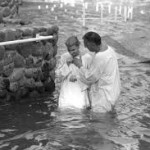Third Sunday of Advent – Cycle C
Reflecting on Luke 3: 10-18
I like to imagine what John the Baptist would say to us if he saw us standing in line at the Jordan. “What should we do?” asked the crowd that had followed him into the wilderness.
He looked at each one and told them what particular thing was keeping them from the fulfilling the Law in their own lives. “Stop cheating.” “Stop extorting.” “Stop hoarding what you’ve got.”
Hmm. So what would he say to us? Imagine the Baptizer encountering us, leveling his refiner’s fire at us. I suspect we would hear things like, “Stop being anxious. Your heavenly Father knows what you need.”
Or, “Stop working so hard to provide things. Your family needs YOU more than things.” Or maybe, “Stop secretly harboring grudges. Accept the grace to be healed of ancient wounds.”
Here’s an Advent assignment: imagine being face to face with the Baptist. What would he require of you before plunging you in the water?
What would YOU like to say about this question, or today’s readings, or any of the columns from the past year? The sacred conversations are setting a Pentecost fire! Register here today and join the conversation.
I have come to light a fire on the earth; how I wish it were already burning (Lk.12:49).


One of the most sacred memories of my childhood is sitting in the hushed and darkened church waiting for midnight Mass to begin, sleepy and still wrapped in the warmth of the Christmas Eve family celebration we had just left. The words of the opening prayer spoke so deeply to the moment, and have stayed with me through all the years: “Lord our God, with the birth of your Son, your glory breaks on the world. Through the night hours of the darkened earth, we your people watch for the coming of your promised Son.”
I hold that memory and that invocation close to my heart on this Christmas Day. The sense of waiting in the “night hours of the darkened earth” seems so terribly real and close in light of all the tragic news of the past few weeks and days. There is an aching certainty that we are still waiting for the promised joy, a feeling that something vital and necessary is missing in our culture, in our hearts.
The power of the Christmas liturgy for me has always centered not on a picturesque and anodyne account of the baby Jesus, but in the proclamation that the Incarnation marks the beginning of the work of our redemption. That it was only by accepting and embracing our humanness that our God could save us through his death and resurrection. It is terrifying and exalting to think about this in personal terms, to believe that every human life has been redeemed by his sacrifice. That I myself am known and precious to the Savior.
And tonight my thoughts turn to the volunteer firemen killed yesterday in New York, the innocents in Connecticut earlier this month, the moviegoers in Aurora this summer, and the countless others who were lost to violence. To know that each of them was precious to his or her loved ones and to God is more than the heart can bear. It is incomprehensible how those lives could mean so little to the ones who took them with such violence.
But this points to the very thing that seems to be missing today: the fundamental recognition of the value and sanctity of every human person. We diminish it in ways small and large, sometimes without notice. It begins with negative self-talk and with accepting unexamined prejudices about others. It lies at the root of bullying and tormenting of the weak, the different, the lost. It appears in the public discourse in the grotesque parodies constructed on both sides of the increasingly polarized partisan divide until we become implacably set against our depersonalized and demonized “opponents.” And its reality is all too apparent and literal in the actual taking of lives, from domestic violence to acts of sexual predation, from crime- and drug-related killings to the rampages of deranged and evil mass murderers.
Whether the glorification of violence and the commodification of sexuality in media and popular culture are contributing causes of this abasement of human dignity or are just its inevitable manifestations, it amounts to the same. Its prevalence is undeniable and it leads to the unbearable tragedies for the families, friends, and communities of those we have lost.
What meaning, then, can the Christmas proclamation have in the face of this reality?
Maybe Christmas reminds us once again that every life is sacred. That God came to live as one of us BECAUSE we are uniquely valuable and precious. That we are called to cherish and respect every person we encounter: the broken and the whole, the friend and the stranger.
And so we wait still in the night hours of the darkened earth. We wait until every tear is wiped away. We wait together in hope. Waiting, still waiting.
Come, Lord Jesus, come!